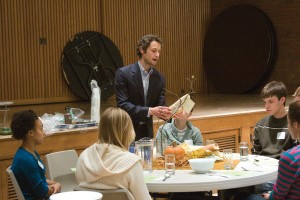Scene
Food, faith and shared community: Sacred Meals brings students together
The students joined employees and clergy from Hillel, the Catholic Student Center (CSC), Lutheran Campus Ministry and other University officials for an interfaith dinner aimed at bringing the many religious voices of Wash. U. together for dialogue and community building.
“We wanted to bring people together,” said Brian Blosser, the Campus Ministry Intern at the CSC and a 2008 alum. “Sharing a meal with someone is sharing community.”
The idea for Sacred Meals stemmed from conversations between Rabbi Andy Kastner, the Silk Foundation Campus Rabbi at Hillel and leaders from the Lutheran Campus Ministry about sustainable eating practices.
“Making that connection of shared value, we just continued the conversation from there. It slowly grew,” Kastner said. “I think the idea originated really organically.”
Student leadership was central to the event’s success. Juniors Hannah Rabinowitz, Kelly Diabagate and Lee-Ann Felder and sophomore Alaa Itani all helped to facilitate group dialogue and plan the event.
Rabinowitz, who helped plan Pluralism Week last year, formulated the idea for some sort of interfaith dinner during the summer, at which point she contacted both Kastner and Father Gary Braun of the CSC.
The dinner, possibly the first of many, was not advertised publically. According to the event’s organizers, this enabled them to bring students together for a more intimate meal.
Every table featured at least one Jewish, Catholic, Protestant and Muslim student or adult.
“I was really excited with the turnout. We got a really diverse group of people of different backgrounds that can comment on different aspects of how food and their religion come together,” Itani, a practicing Muslim, said.
The event focused on dialogue surrounding the sustainable production and consumption of food. The dinner of salad and butternut squash and lentil soups was prepared with produce from the Burning Kumquat, the organic student-run garden. Challah for Hunger provided freshly baked bread, and the CSC provided china plates that could be washed and re-used.
Maddie Earnest, co-owner of Local Harvest Grocery, Café, and Catering, delivered a keynote speech before the meal. Local Harvest showcases local produce and meat from around Missouri and Illinois, with approximately 50 percent of food coming from within 150 miles of St. Louis.
“I think that, regardless of religion, food is something that we can come together on,” Earnest said. Earnest described ways in which omnivores and vegetarians alike can look for sustainably produced food free of chemicals, antibiotics or pesticides.
The junction of food with religious pluralism facilitated a lively discussion, featuring topics ranging from positive and negative interfaith experiences to a debate on the merits of keeping kosher.
“I think that food can unite all of us,” said Nadeem Siddiqui, the resident district manager of WUSTL Dining Services. “People are people. If you get to know them, then you can do amazing things.”
Senior Sylvia Johnson expressed an interest in keeping kosher, though she is not Jewish. Johnson’s motivation stems from observation of a friend’s dietary habits.
“I guess it’s the integrity of it,” Johnson said. “To treat something as black and white can be very helpful.”
Responses to the event have been nothing but positive.
“There are so many negative examples of religions that to have such a positive gathering share religious caring about local food, it’s huge,” said Rebecca Boardman, the pastor at the Lutheran Campus Ministry.
Rabinowitz said the event exceeded her expectations.
“I just felt like everyone there was really serious and committed to having a respectful and productive dialogue,” she said.
The event’s leaders say that, based on the event’s success, more interfaith events will likely follow over the course of the year.
“We put evaluation forms for students to fill out, and they were overwhelmingly positive. There was a lot of enthusiasm,” Kastner said. “The language that students used to describe the experience was not ‘program,’ was not ‘event’…but what they think was an initiative. It struck me that there was something more profound about this experience.”

